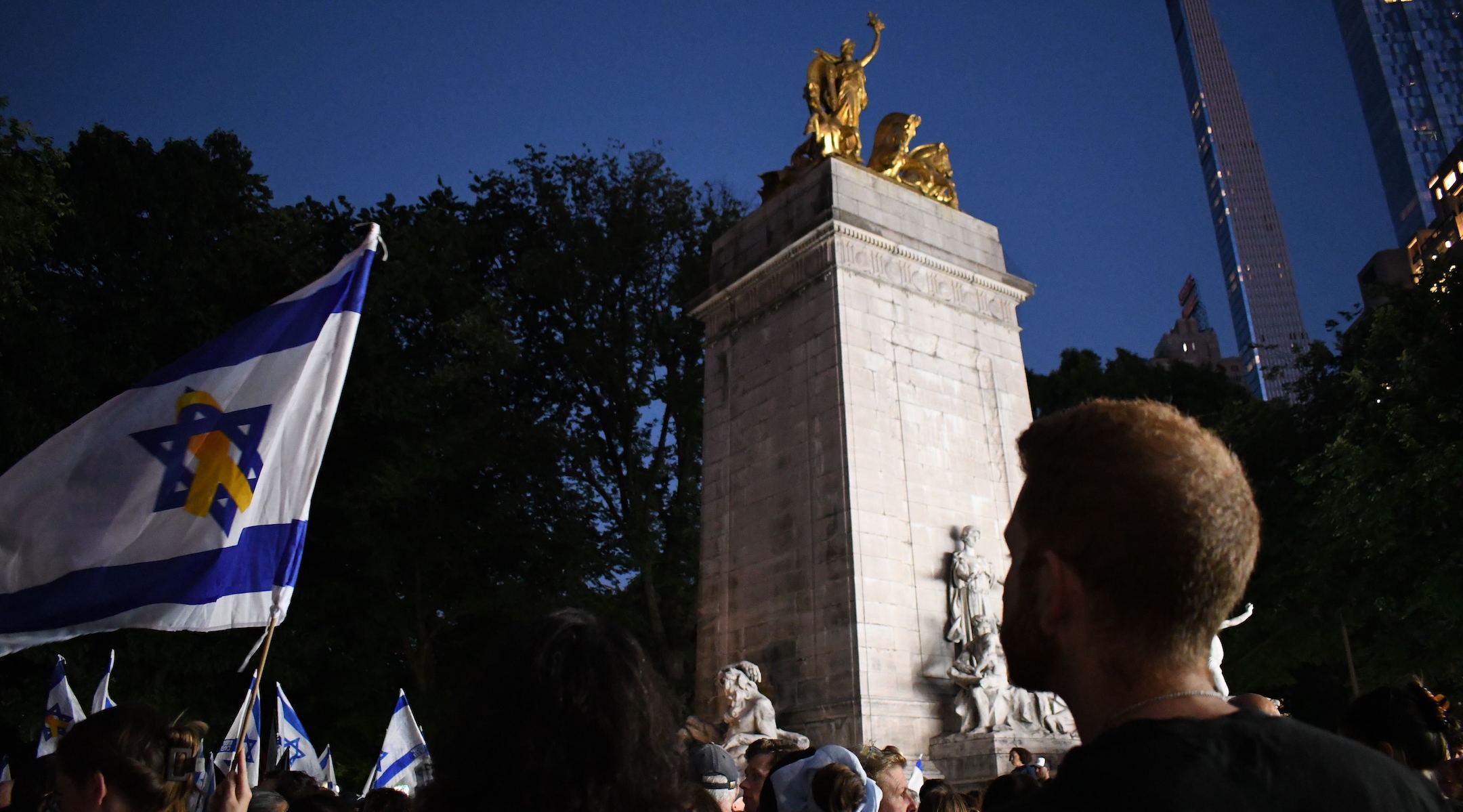At Columbus Circle vigil for 6 Israeli hostages, a mix of anger and mourning
The crowd waved American and Israeli flags, some of them also featuring the yellow ribbon that symbolizes advocacy for the hostages

A Columbus Circle vigil on Sept. 1 for the six dead hostages drew thousands of attendees. (Jackie Hajdenberg)
(New York Jewish Week) — Two thousand people gathered at Columbus Circle on a hot and humid night Sunday for a vigil mourning the six Israeli hostages whose bodies were found in Gaza, an impromptu gathering of song, prayer and tears about 24 hours after the news of the captives’ death sent Israel and the Jewish world reeling.
Like many Israel-focused demonstrations in New York City over the past two years, this one was held in parallel with mass demonstrations in Tel Aviv and throughout Israel. The focus of those Israeli demonstrations — indignation toward Israeli Prime Minister Benjamin Netanyahu for failing to free the hostages — was also present at the midtown gathering.
But those feelings mixed with more subdued and soulful moments focused on lamenting the lives lost — including Hersh Goldberg-Polin, the American-Israeli who, via his parents’ activism, has become a global symbol of the more than 100 hostages still in Gaza. Attendees said the losses of people they didn’t know thousands of miles away still hit them hard.
“I haven’t met any of these people, but they feel so close,” said Sharon Litwinoff, an Upper West Sider who attended the rally. “It was always devastating to hear about all of the deaths and everything, but this one felt even more personal.”
The crowd waved American and Israeli flags, some of them also featuring the yellow ribbon that symbolizes advocacy for the hostages. Some wore other symbols of the fight for the hostages, such as dog tags or shirts reading “Bring them home now.”
Rabbi Angela Buchdahl of Central Synagogue led the crowd in singing “Acheinu,” a traditional prayer for Jews in distress that has become a post-Oct. 7 mainstay in many synagogues. The crowd, a mix of Americans and Israelis, also sang Hebrew standards including “Ani v’Ata,” about the power of individuals to change the world, and “Lu Yehi,” composed by Naomi Shemer during the 1973 Yom Kippur war.
Goldberg-Polin was one of eight American hostages remaining in Gaza, at least four of whom are now known to be dead. The parents of another, Omer Neutra, spoke at the rally. Like Goldberg-Polin’s parents, the Neutras have been public faces of the group of hostage families, and spoke at a political convention in front of millions of TV viewers earlier in the summer. Orna Neutra, Omer’s mother, called on attendees to keep pushing American and Israeli leaders to achieve the captives’ freedom.
“How is it that 11 months into this nightmare, we are not home yet, caught in this geopolitical nightmare in which we feel our son and the hostages are not the priority,” Orna Neutra said at the rally, mentioning “the importance of the redemption of the captives… These Jewish values have always been at the core of Israeli society, but somehow as hostage families we find ourselves fighting not only for our loved ones, but to remind our leaders here and in Israel how critical these values are to our Jewish soul.”
Attendees also highlighted the nature of the captives’ deaths — they are thought to have been killed shortly before their bodies were discovered — as a reason why it was important to show up at Sunday’s rally.
“The loss would be tremendous regardless,” said Chen Drachman. “But I think really the major thing is the fact that we all know that they had survived there up until two days ago, which is absolute insanity. It’s just heart wrenching.”
Mira Davis, an assistant cantor at Park Avenue Synagogue who met Goldberg-Polin’s parents on a February trip to Israel, articulated the mix of personal anger and mourning that many in the crowd felt.
“Hirsch was American-Israeli, and so I think it hits home for a lot of us,” she said. “Not that one life is more important than any other, but a lot of us have gotten to know his parents through the media.”
She added, “I think for a lot of us, especially in the New York Jewish community, it really hit hard, and a lot of us are just angry. They did not need to die.”














